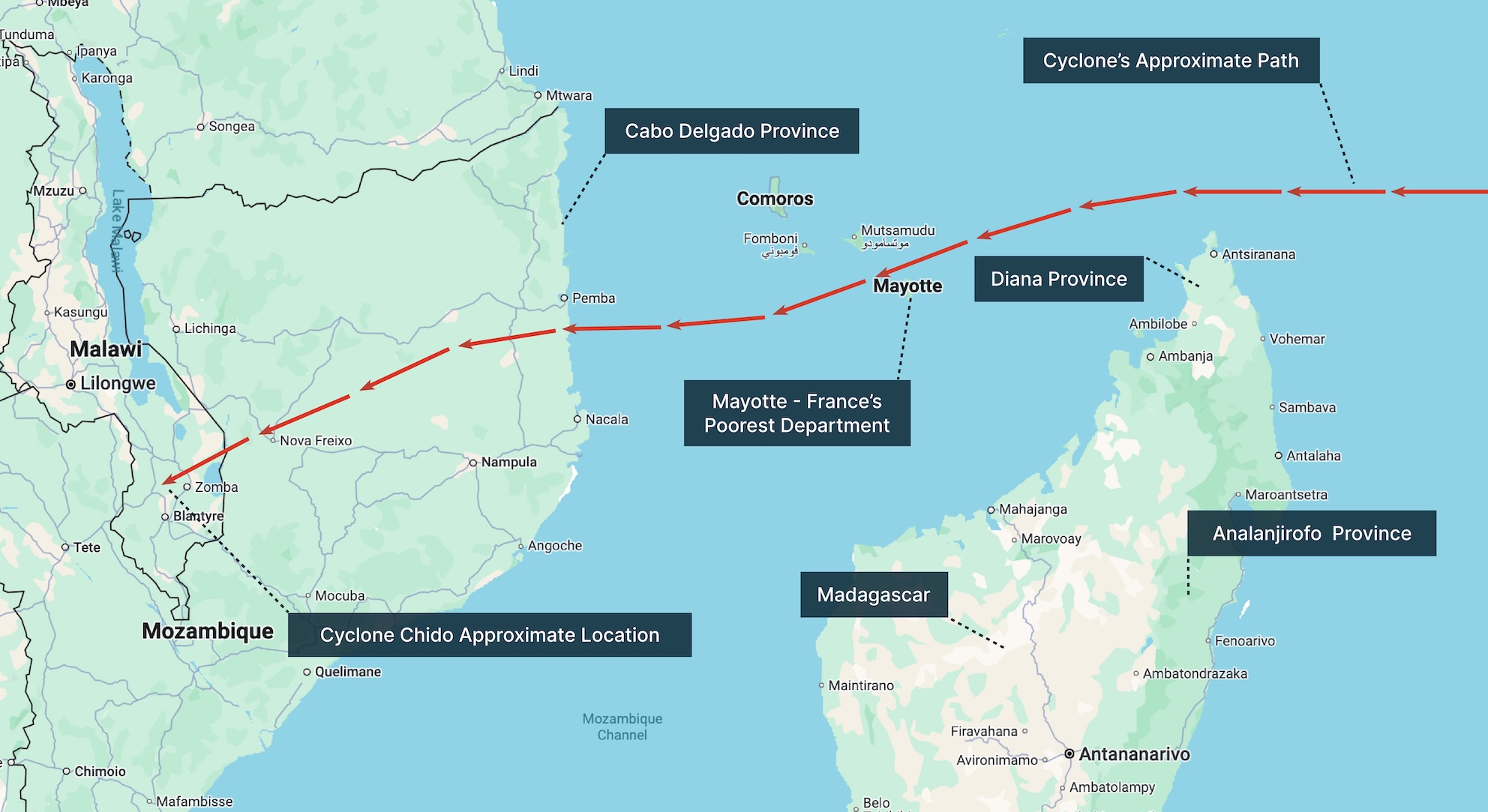Alert+
Cyclone Chido: Mayotte, Comoros, and Mozambique Face Crisis
Intelligence cut off: 12:00 GMT 16 of December 2024
On 14 December 2024, Cyclone Chido hit the French Overseas Territory of Mayotte in the Indian Ocean. Cyclone Chido is considered the most severe cyclone to hit the region in almost 100 years, making landfall in Mayotte at Intense Tropical Cyclone strength with maximum wind speeds exceeding 225 km/h (139 mph).
At least 14 fatalities have been recorded; however, authorities currently assess that the death toll could reach 1000 with thousands more displaced. Hundreds of homes have been destroyed and several government buildings have been severely damaged, including Mayotte Hospital and multiple medical centres have been rendered non-operational.

Cyclone Chido Path
In Comoros, storm surges caused by Cyclone Chido resulted in widespread flooding in the capital Moroni and other coastal towns. Flooding has damaged multiple homes, businesses, fishing infrastructure, and roads, disrupting transport and delaying emergency responses.
In Madagascar, the northern regions of Diana and Analanjirofo regions were primarily affected by flooding, resulting in damage to transport infrastructure, homes and energy infrastructure, leading to blackouts.
Cyclone Chido made landfall in the Cado Delgado province in Mozambique early 15 December, threatening 1.7 million people. The storm damaged or destroyed homes, schools, and health facilities, and numerous flights were cancelled at Pemba Airport. Cabo Delgado has reportedly experienced large-scale internet disruptions caused by the storm. Authorities have warned of potentially having to evacuate low-lying areas.
SOLACE GLOBAL COMMENT
Cyclone Chido Recovery: France Mobilises Rescue Teams for Devastated Mayotte
Recovery efforts are ongoing in Mayotte and the death toll is almost certain to rise. France has mobilised rescue teams and supplies from mainland France and the French territory of Reunion, with 160 firefighters and soldiers being sent to Mayotte to bolster the 110 French military personnel currently undertaking rescue operations. The immediate effort of French rescue teams is to establish an air and sea bridge to Mayotte to facilitate the delivery of humanitarian aid.
There are severe transport disruptions in Mayotte, including mass flight cancellations at Dzaoudzi Pamandzi International Airport (DZA), which has been subjected to significant levels of damage. The French interior ministry is set to host a crisis meeting on the situation to determine response. Travellers to the area should expect mass disruption to healthcare provision and significantly slowed emergency response times.
Due to the intense rainfall in northern Mozambique, there is a high risk of landfalls. Furthermore, authorities have indicated that communities may be cut off from schools and health facilities for weeks due to damaged infrastructure. Mozambique’s meteorological agency has issued warnings for multiple provinces due to strong and dangerous winds until midnight on 17 December.
The storm weakened into a moderate tropical storm then a remnant low on 16 December as it tracked into Malawi. As of 16 December, sustained windspeeds have reduced to approximately 50 km/h (31 mph). Malawi is unlikely to be significantly impacted by the storm, but transport-related disruptions cannot be ruled out.
SOLACE GLOBAL ANALYSIS
Storm Damage Likely to Trigger Unrest as Mayotte, Comoros , and Mozambique Grapple with Recovery
Areas that Tropical Cyclone Chido has affected will almost certainly experience transport disruptions. Mayotte’s only international airport has experienced major damage, making it difficult for authorities to restart operations. Damage to infrastructure in areas affected by the storm may affect recovery efforts and will almost certainly exacerbate health and poverty issues in the coming weeks. Death tolls will almost certainly continue to rise as authorities confirm casualties from the storm.
Mayotte, a French overseas department, has experienced significant political tensions driven by illegal migration and economic frustrations. Its high levels of poverty and crime alongside overwhelmed infrastructure from the high numbers of migrants make it France’s poorest department. The French government has recently attempted to revoke birthright citizenship, changing Mayotte’s constitution and conducting mass deportations, a highly controversial move.
The damage from the tropical cyclone is highly likely to exacerbate tensions by further straining Mayotte’s infrastructure, damaging its crops, and pushing more residents below the poverty line. As such, Mayotte’s population may direct its anger against the ruling authorities and conduct significant social unrest to express their frustration.
In Comoros, resources are generally strained. Deforestation and coastal erosion have caused significant damage to local communities and approximately 40 per cent of the population lives below the poverty line. The cyclone has caused significant damage, which will almost certainly further disrupt local communities and strain government resources, displacing many. Agriculture, which accounts for over 35 per cent of employment, will likely be affected by damaging winds and flooding, pushing more residents below the poverty line. Parliamentary elections are set to take place in Comoros on 12 January 2025. The damage inflicted by the storm is highly likely to exacerbate tensions, which are already high and may contribute to unrest in the country.
In Mozambique, the cyclone has affected the Cabo Delgado region, an area experiencing an ongoing insurgency. Moreover, significant unrest regarding the October election has been ongoing in the region. As such, the government’s ability to commit resources to the areas affected by the cyclone will highly likely be significantly hindered. While the coming days may see reduced unrest as communities seek immediate safety in the aftermath of the cyclone, unrest in Pemba will likely increase in the coming weeks.
Travel Risk Advice: Precautions for Cyclone Chido-Affected Zones
- Closely monitor local news reports and government alerts.
- Adhere to all instructions issued by the authorities.
- Follow evacuation orders and travel to government-designated shelters if it is safe to do so.
- Do not return to your residence until authorities have declared it safe.
- Ensure that important documents and medications are stored in a waterproof container.
- Maintain communication with an emergency contact and conduct regular check-ins.
- Prepare an emergency “go bag” with essentials such as bottled water, batteries, important documents, and medications.
- Confirm that booked flights are operating before checking out of hotels or travelling to the airport.
- Prepare for power outages, communication disruptions, and travel delays.
- Due to the risk of flooding, avoid low-lying coastal areas and locations near bodies of water whenever possible.
- Stay away from damaged buildings and affected areas until authorities have deemed them safe.
- Do not drive or walk through flowing water, even if it appears relatively shallow.
- Exercise caution around downed power lines and unstable structures.
- Dispose of any food that has been exposed to floodwater.
- Do not use damaged electrical appliances.
- If you smell gas, leave the area immediately.
- Monitor yourself and others for symptoms of waterborne diseases and seek medical advice immediately if symptoms appear.
- Management should maintain communication with affected individuals until the event has concluded.

